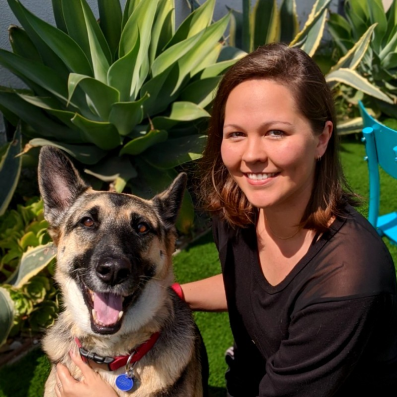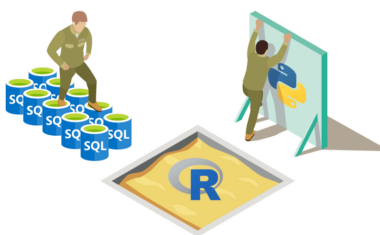How To Become a Data Scientist Without a Degree in 2023

In this article
- Can You Become a Data Scientist Without a Degree?
- How To Become a Data Scientist Without a Degree
- Resources To Help You Become a Data Scientist Without a Degree
- What if You’re Considering a Degree?
- What the Experts Say About Becoming a Data Scientist Without a Degree
- FAQs About Becoming a Data Scientist Without a Degree

As the tech industry has continued to boom in recent years, creating exciting jobs that are often coupled with lucrative salaries, it’s no surprise that a growing number of people are making career changes to get in on the action.
While some of those transitioning into the tech workforce already have a background in data analytics or hold a relevant college degree, a growing contingent is starting from scratch, enrolling in specific training programs or bootcamps to shore up their skills and prepare them for a new career. And it’s working. Course Report has found that when it comes to return on investment, coding and data bootcamps “require less time, less money, and offer nearly equal earnings when compared to a CS degree.” Hiring managers at some of the world’s top tech companies have also stressed the importance of a candidate’s skill and attitude over the school listed on their CV.
All of this is to say that whether you’re new to the workforce or ready to make a mid-career leap, there are paths into data science that don’t require a college degree. The following guide offers key strategies for ensuring you have all the necessary skills to do the job and stand out from a competitive hiring pool.
Can You Become a Data Scientist Without a Degree?

In 2016, DJ Patil, who served as the first chief data scientist of the United States, tweeted: “Data science doesn’t care about what you majored in or if you even got a degree. It’s what you do with data that matters.”
Although having a relevant college degree can help, the truth is that many organizations hire data scientists who don’t hold a degree. What matters, as Patil noted, is that a candidate is able to do the job of a data scientist—wrangling big data, performing data analysis, understanding multiple programming languages—all of which can be learned through a data science bootcamp.
How To Become a Data Scientist Without a Degree
-
Perfect Your Prerequisites
-
Refine Your Data Science Skills
-
Practice With Data Science Projects
-
Build a Portfolio
-
Consider Related Jobs
-
Practice Your Interview Skills
-
Work Towards the Job You Want
Becoming a data scientist without a degree requires a significant time investment, and gaining a competitive edge through portfolio projects or certifications can take even longer. But if you’re willing to put in the work, it can lead to a rewarding career.
Related Read: How To Get Into Data Science (Without a Data Science Degree)
Perfect Your Prerequisites
Mathematics and statistics are the foundation of data science. In order to determine usage trends, create forecasts, and tease out meaningful insights from data, you’ll need to use math and statistical concepts such as probability, variance, standard deviation, linear algebra, and calculus. As you move towards more complex problems, you’ll rely on concepts such as logistic regression, decision trees, and linear regression. Perfect these skills and you’ll be starting your career on the right foot.
Refine Your Data Science Skills

A significant part of a data scientist job description involves accessing, collecting, cleaning, wrangling, and storing both structured and unstructured data. Knowing how to use relational databases like MySQL or MongoDB is necessary for data science. Fluency with tools like Hadoop or Spark to store and process big data can also come in handy in your data science career. And knowledge of multiple programming languages—specifically SQL and Python—is crucial. Other languages a data scientist should be familiar with include:
- R for statistical inference and analysis
- Perl for text manipulation and structuring
- Scala for ingesting, storing and processing big data
Practice With Data Science Projects
Once you have a comfortable grasp of the key skills, it’s time to jump into the deep end. Test yourself with Kaggle or TopCoder competitions — the data science version of a hackathon — and apply the skills you have. Doing this not only offers valuable hands-on experience with data science, it also gets you the chance to be noticed, while collaborating with some of the country’s top data scientists.
Build a Portfolio
A CV tells hiring managers what you’re capable of, but it’s a portfolio that provides the evidence. If you’re just getting started as a data scientist and lack real-world work experience, there are still ways to work on portfolio-worthy projects.
- Do personal projects. Use publicly available datasets and create your own dashboards. Identify interesting opportunities and build your own case studies.
- Find internships. Smaller companies and startups will be happy to take data science interns for short-term projects. Use this to gain something more valuable than a degree — real-world work experience!
- Take on pro-bono work. Several government departments, NGOs, and small businesses can use your help. Seek them out and help them. In fact, if you have a business owner friend, ask for their website/e-Commerce usage data and build some dashboards for them.
Consider Related Jobs
Taking a related job or internship can be a great way to gain exposure and experience with the problems and skills a data scientist deals with. For example, internships often offer candidates rotations across different departments, giving interns a chance to work on a variety of projects alongside industry professionals. Alternatively, working as a data analyst can bolster an individual’s analytical skills, develop their understanding of using data to meet business needs, and build their experience with working on teams.
Practice Your Interview Skills

The data scientist hiring process typically involves a portfolio, cover letters, and references. Many organizations also use interview loops to measure a candidate’s talent and qualification for a role, which can involve technical interviews, tests that require writing algorithms, an SQL coding interview, and a series of questions designed to reveal a candidate’s values.
Related Read: 10 Best SQL Certifications To Grow Your Skillset
Many of the interview questions — both technical and behavioral — can be challenging, which is why it’s important to prepare as best you can. Many former candidates have shared commonly asked interview questions, mentors and bootcamp instructors can help students workshop their answers, and whether you’re interviewing in person or remotely, read up on the best practices that will ensure a smooth and successful interview.
Get To Know Other Data Science Students
Isabel Van Zijl
Lead Data Analyst at Kinship
Melanie Hanna
Data Scientist at Farmer's Fridge
Meghan Thomason
Data Scientist at Spin
Work Towards the Job You Want
Similar to considering related jobs, your first job in data science might not be the one you want. That said, there is immense value in getting a foot in the door and making lateral moves toward your dream job. For example, if you get your start in data analytics, you can strengthen your data analysis skills, which will ultimately be useful in a data science role. Alternatively, if you get your start in data warehousing or management, the knowledge you develop on data structures and databases will make you a stronger data scientist. It’s important to set goals to ensure that you’re making the most of each role, and every technical and soft skill you gain is bringing you closer to the job you want.
Resources To Help You Become a Data Scientist Without a Degree

If you want a comprehensive self-paced program that covers everything from the basics of data analytics to working with machine learning algorithms, Springboard has a data science career track that offers learning guidance, mentorship, and support from career counselors to help get you workforce-ready. But if you’re looking to go at it on your own or to supplement what you’ve already learned, below are resources that can bolster your knowledge of data science skills and concepts.
- Statistics
- How Bayes Theorem, Probability, Logic and Data Interact – This short primer on the Springboard blog covers the basics of probability and logic, and how they interact with data.
- Think Stats – This book by O’Reilly Media explains statistics from a programmer’s perspective and is a handy guide to the stats knowledge you’ll need as a data scientist.
- Mathematics
- What math subjects would you suggest to prepare for data mining and machine learning? – This thread on the Stats Stack Exchange covers a self-made curriculum of math topics you’ll need to know to succeed in data science.
- 15 Mathematics MOOCs for Data Science – This blog post sources a variety of free online courses that can help you with your math skills.
- R/Python
- Data science sexiness: Your guide to Python and R, and which one is best – This guide explains the differences between R and Python and how you can learn both.
- SQL
- W3Schools SQL Introduction – This tutorial from W3schools can help you learn data science with the basics of SQL.
- 18+ Best Online Resources for Learning SQL and Database Concepts – This list contains resources to help accelerate your SQL learning.
- The SQL Tutorial for Data Analysts – This free interactive tutorial to SQL by Mode will take you from learning the basics of SQL to applying it to real-world cases.
- Business Knowledge
- The Data Science Process – Springboard’s seven-day email course will help you frame your data science insights in a way that will change business outcomes.
- Guide to Data Science Jobs – Springboard’s guide to data science jobs gives you an overview of what business knowledge you need to be a successful data scientist.
- Data Visualization
- A Dramatic Tour Through Python’s Data Visualization Landscape – This guide walks through the rich data visualization landscape in Python, covering the tools you can use to visualize your results.
- FlowingData – Nathan Yau’s blog is one of the web’s leading authorities on data visualization tools and techniques.
What if You’re Considering a Degree?
If you want to pursue a college degree on your path to becoming a data scientist, below are some degree options to consider.
Degree Paths To Consider
People working in data science often hold a bachelor’s degree in computer science, mathematics, finance, statistics, or economics. However, a degree in a related field such as engineering, physics, or information technology can also offer a path to a data science career. A growing number of colleges also offer data science-specific programs, although these are typically offered as advanced degrees.
While the average data scientist holds a bachelor’s degree, many also hold a master’s degree in a relevant field. Those who work in more advanced areas of data science such as machine learning engineering, natural language processing, artificial intelligence, and neural networks, might also hold PhDs.
What the Experts Say About Becoming a Data Scientist Without a Degree

The overwhelming consensus from industry professionals is that a bachelor’s or even master’s degree can be useful—there’s no helping that some hiring managers are biased in favor of those who hold degrees—but it’s by no means necessary in order to have a successful career as a data scientist.
“Candidates coming out of certain MS / Ph.D. programs may have advantages in data science,” wrote data science manager William Chen, “but if you can already get data science internships/job offers then there’s no need to pursue an additional degree to advance your career potential.”
In a separate Quora post, Chen listed helpful recommendations for people hoping to begin a career in data science without going to college at all.
In a Reddit AMA, AI expert and Google Brain co-founder Andrew Ng was asked whether an advanced degree was necessary to work in machine learning. He said, “Absolutely not! I think a Ph.D. is one great way to learn about machine learning. But many top machine learning researchers do not have a Ph.D.”
Speaking more broadly, he added that “newer companies—ones that know how to evaluate machine learning talent—care more about your ability and less about the credential (such as MS or Ph.D.).”
Daniel Carroll, a principal data scientist at Aetna, touched upon this during a recent Springboard Q&A:
“So I have just a bachelor’s degree, but that’s definitely not the norm. Many of the best data scientists and AI people I have worked with have been Ph.D.s. There certainly is a bias towards having an advanced quantitative degree, and I think it’s well deserved. There can be a bias against people with only bootcamp experience as well. However, the one thing a bootcamp can deliver that a really good university can’t is a really thorough understanding of how to build something from ideation to deployment—that’s a full-fledged capability I don’t see often from Ph.D.s. If you can bring that to light in a CV or interview, that will make you shine.”
Of course, the Springboard alumni community is full of examples of people who launched data science careers without having degrees in a technical area.
David Gibson was a film major who switched to marketing and then began taking the Introduction to Data Science course while still in school. He moved on to the Data Science Career Track and now works as a data and operations coordinator at a mobile-first advertising company.
After graduating with a bachelor’s degree in chemical engineering, Melanie Hanna worked in a variety of manufacturing settings before pivoting to data science.
George Mendoza came from a liberal arts background, having majored in history and economics. Shortly after completing the Data Science Career Track, he got a job as a data scientist at an AI consulting startup.
An advanced degree “certainly helps,” he said. “It’s a good signal that you can commit to something long-term, you obviously have some academic rigor behind you. But once you’re in the room with somebody, whether that’s a hiring manager or a client, it’s just you up there. It’s not you and your degrees.”
FAQs About Becoming a Data Scientist Without a Degree

Still have questions about pursuing data science without a degree? Check out our answers below to frequently asked questions.
What Qualifications Do You Need To Be a Data Scientist?
There are no mandatory formal qualifications required to become a data scientist. However, there are certain skills and proficiencies that every data scientist is expected to have. For example, data scientists are expected to be fluent in programming languages such as SQL and Python. Data scientists also need to know how to build and manage data pipelines, clean and wrangle data, and use statistics and probability to glean insights from big data.
Is Data Science Hard To Get Into?
While the role of a data scientist is less coding-oriented when compared to a software engineer, it still requires time and effort to learn and build on the skills required to do the job. A comprehensive data science bootcamp can take up to six months to complete with a 15-20 hour study commitment per week. Those who need to take introductory programming courses to familiarize themselves with Python will need additional time.
Can You Become a Data Scientist Without a Computer Science Degree?
In short, yes. Many data scientists don’t have a college degree in a relevant field (or, in some cases, don’t have a degree at all). What matters to organizations is that a data scientist possesses the relevant technical and soft skills needed to do the job.
Since you’re here…
Curious about a career in data science? Experiment with our free data science learning path, or join our Data Science Bootcamp, where you’ll only pay tuition after getting a job in the field. We’re confident because our courses work – check out our student success stories to get inspired.





